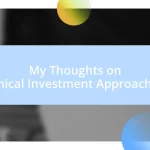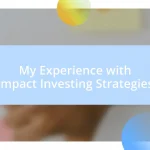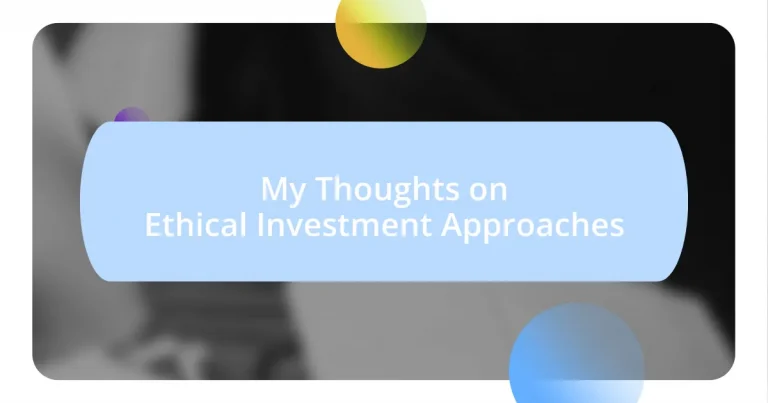Key takeaways:
- Ethical investment strategies align financial goals with personal values, employing approaches like negative screening (avoiding harmful industries) and positive screening (favoring beneficial companies).
- Benefits of ethical investing include a sense of fulfillment, fostering community engagement, and potential lower risks due to better governance in ethical companies.
- Core principles of ethical investment emphasize sustainability, social responsibility, transparency, and community focus, encouraging investments that reflect personal beliefs and initiatives.
- Challenges in ethical investing include varying definitions of “ethical,” balancing ethics with returns, and keeping up with the ever-changing landscape of corporate practices and their impact.
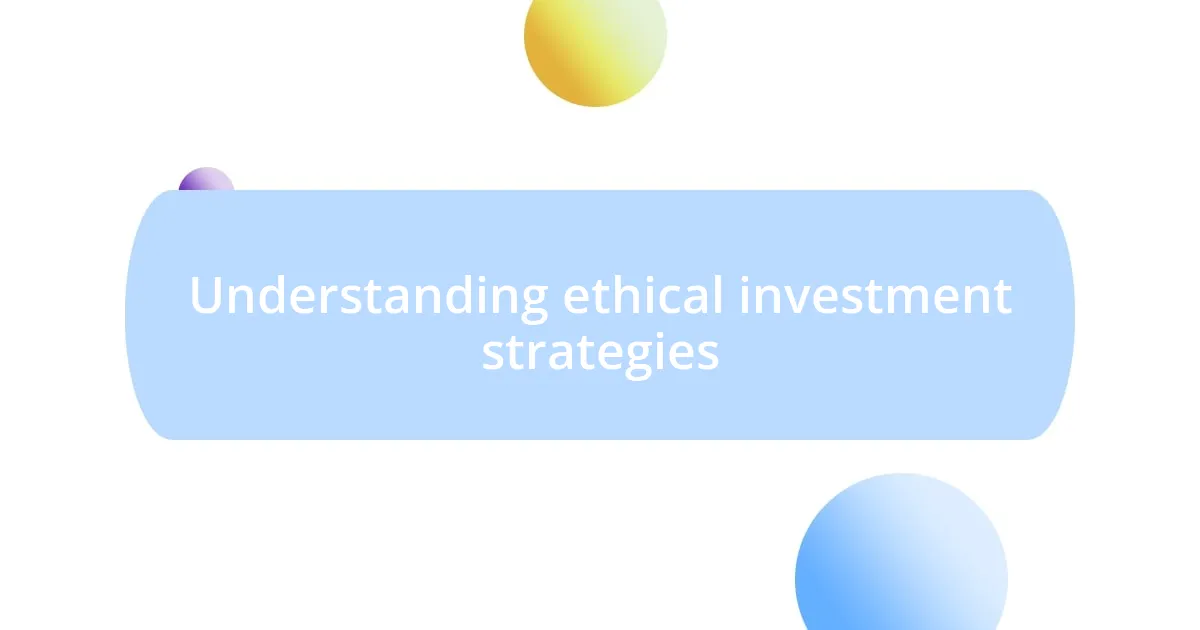
Understanding ethical investment strategies
Ethical investment strategies focus on aligning financial goals with personal values, emphasizing not just profits but also the impact on society and the environment. I remember when I first discovered sustainable funds; it felt like I was finally aligning my financial decisions with my beliefs. Have you ever thought about how your investments can reflect your principles?
One common approach is negative screening, where investors avoid companies that don’t meet specific ethical criteria—like tobacco or weapons manufacturers. This strategy resonated with me when I realized that my hard-earned money was inadvertently supporting industries I fundamentally disagreed with. It made me wonder, what kind of legacy do we want our investments to leave behind?
On the flip side, there’s positive screening, which involves actively seeking out companies making a difference, such as those fostering renewable energy or fair labor practices. I find this particularly inspiring, as it shifts the focus from merely avoiding harm to actively promoting good. Isn’t it empowering to know that our choices can promote progress and sustainability?
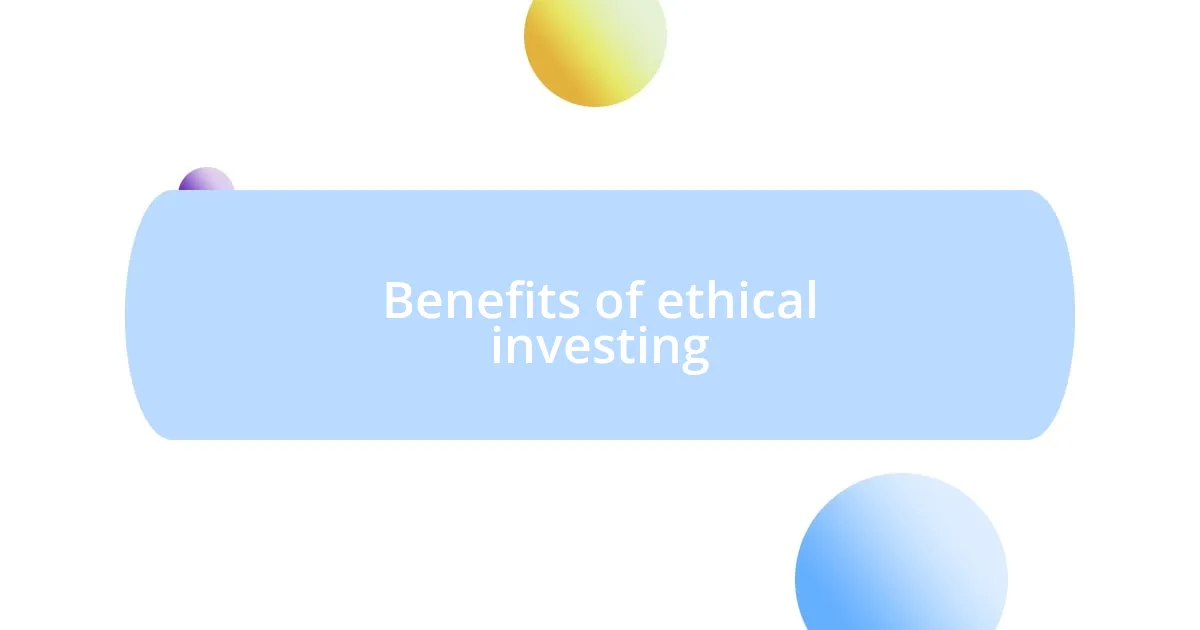
Benefits of ethical investing
Ethical investing offers a powerful opportunity to not only secure financial returns but also create a positive impact in the world. I still vividly recall my first investment in a clean energy project; it was thrilling to think that my money was contributing to solutions for climate change. This sense of purpose I gained from ethical investing was so profound that it reshaped how I view my financial journey.
Additionally, ethical investments tend to foster community and stakeholder engagement. When firms prioritize sustainable practices, they often cultivate stronger relationships with their customers and local communities. I’ve personally noticed how companies committed to social responsibility often resonate more with me. Their authentic dedication inspires loyalty and trust—something that’s simply not as palpable with traditional, profit-driven businesses.
One of the most intriguing benefits I’ve come across is the potential for lower risks in ethical investing. Companies that adhere to ethical standards generally have better governance and face fewer legal troubles. I find myself feeling more secure putting my money behind brands that prioritize transparency and responsibility. It’s like investing in peace of mind, knowing I support companies that are less likely to face scandals or substantial financial penalties.
| Benefit | Description |
|---|---|
| Alignment with values | Ethical investing allows individuals to invest in ways that reflect their personal beliefs, increasing feelings of fulfillment |
| Community engagement | Investing in ethical companies can foster stronger relationships and trust within communities |
| Lower risks | Ethical companies often have better governance, leading to more stability and security for investors |
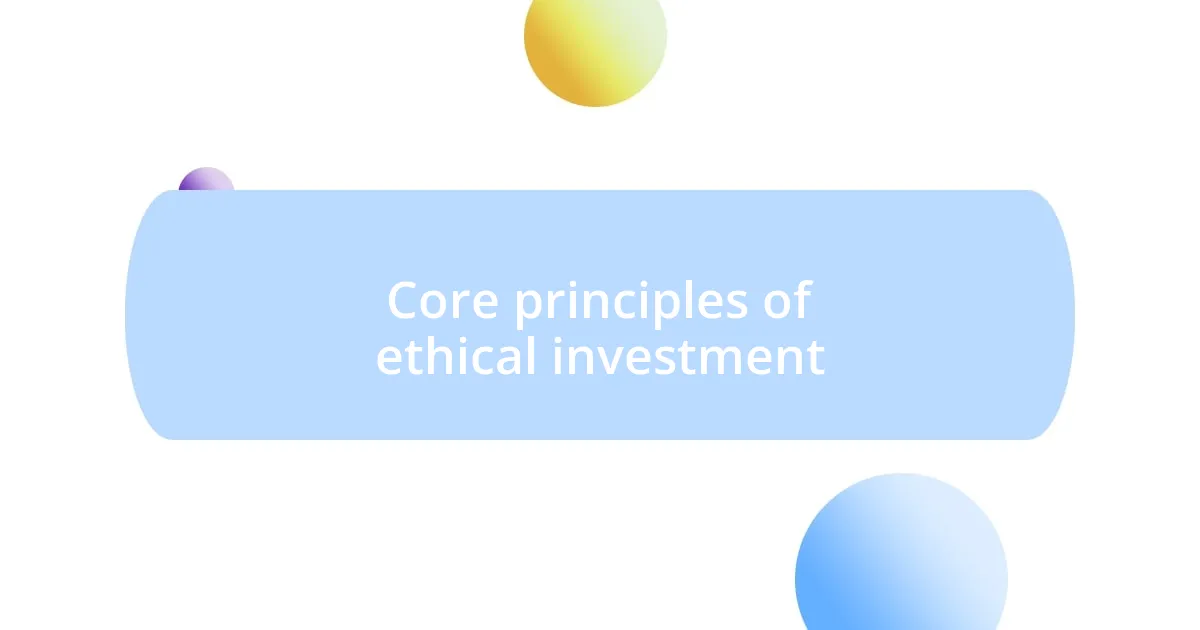
Core principles of ethical investment
Ethical investment isn’t just a trend; it’s grounded in principles that guide investors to make choices reflecting their values. One principle I find particularly compelling is the commitment to sustainability. When I first started considering how my money was being used, I realized that supporting companies with environmentally friendly practices resonated with my belief in protecting the planet. Investing isn’t just a transaction; it’s a reflection of who we are and what we stand for.
- Sustainability: Emphasizing long-term ecological health and promoting environmentally responsible companies.
- Social Responsibility: Investing in entities that prioritize ethical practices and treat stakeholders fairly.
- Transparency: Companies must be open about their practices, allowing investors to make informed decisions.
- Community Focus: Ethical investments often consider the welfare of local communities, fostering a sense of connection and accountability.
I also appreciate the principle of inclusivity. When I support businesses that care about diversity and equity, it reinforces my belief in a fairer society. Seeing my investments bolster not just profits, but also social causes I care about, fills me with pride. It’s empowering to know that every dollar I allocate can support communities and initiatives that resonate with my core values. It makes me feel like I’m part of something larger than myself, and trust me, that sense of community is invaluable.
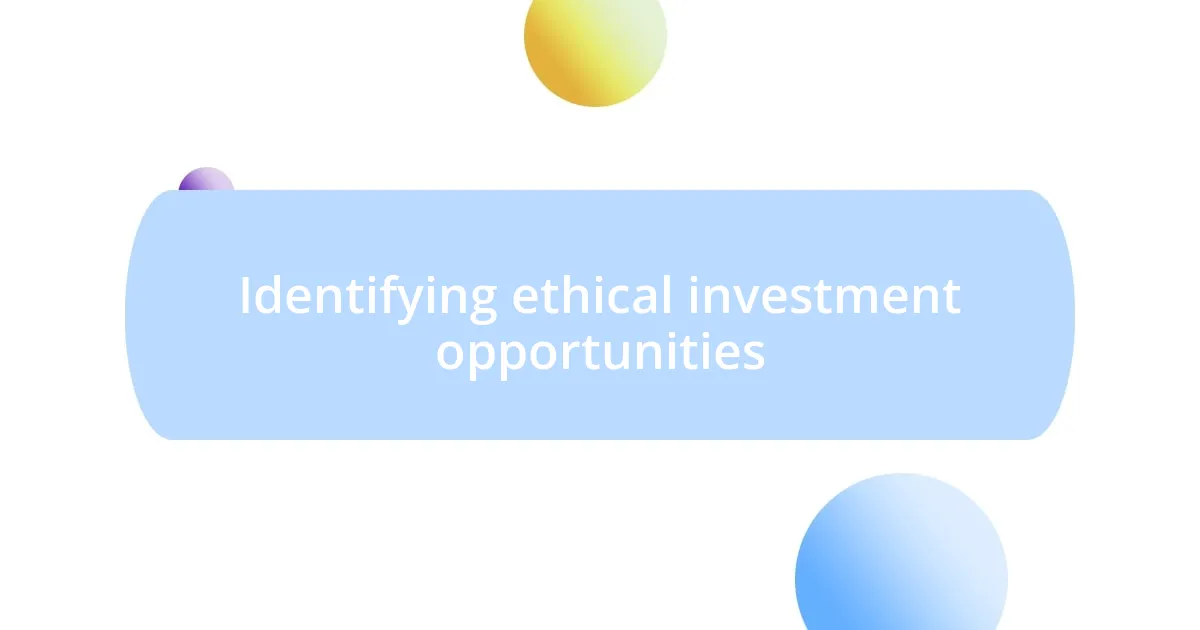
Identifying ethical investment opportunities
Identifying ethical investment opportunities can sometimes feel overwhelming, but I’ve learned to take it step by step. I remember sifting through countless options when I first began. One effective method I find is examining a company’s mission statement and values. If they align with my beliefs, it’s a good indicator that their practices might be ethical too.
I often look for certifications that can help guide my decisions. For instance, companies certified as B Corps prioritize social and environmental performance. When I came across a restaurant holding this certification, it struck me; their commitment to sustainable sourcing and fair labor practices made my dining experience feel even more rewarding. What about you? Have you ever considered how those values play into your spending?
Another great way to discover ethical investments is by tapping into resources like funds that specifically focus on ESG (Environmental, Social, Governance) criteria. I was surprised to find several funds that not only matched my values but also provided solid performance. It’s comforting to know there are diversified options available, making it easier to participate in responsible investing without putting all my eggs in one basket. Have you explored these avenues, or do you have a favorite method for identifying ethical investments?
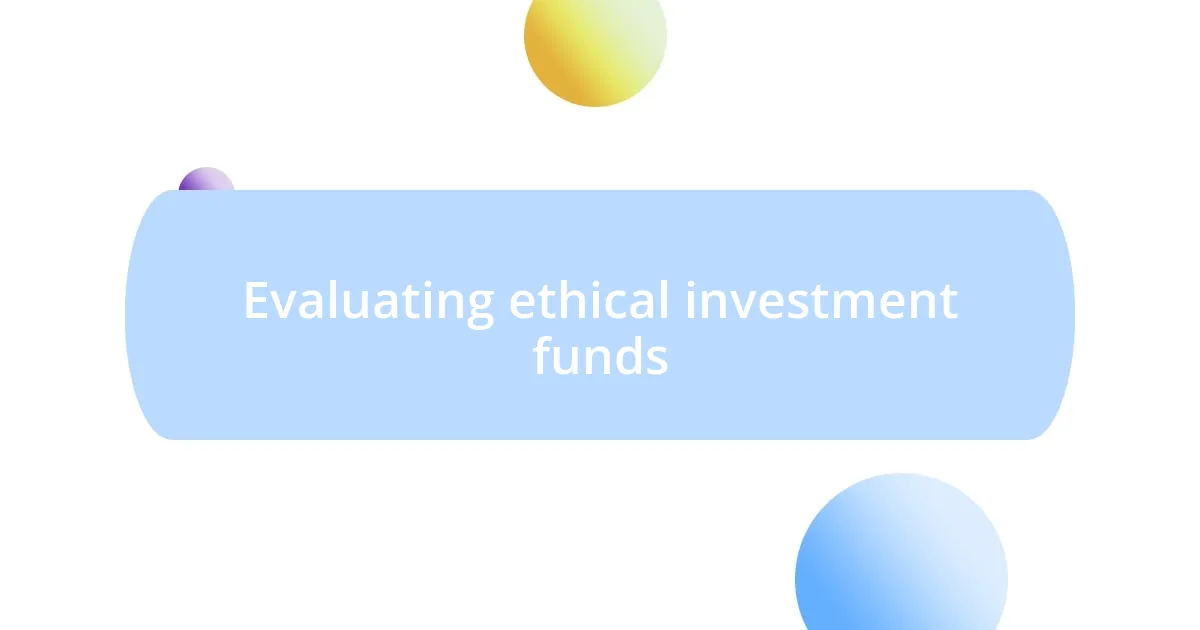
Evaluating ethical investment funds
Evaluating ethical investment funds can initially seem daunting, but I’ve found it’s all about digging deeper into the details. When I first explored various funds, I created a checklist of what mattered most to me, like their alignment with sustainability goals and social responsible practices. Have you thought about what factors genuinely influence your investment choices? This reflective approach can really clarify your priorities.
One of the most revealing aspects of evaluating these funds is their performance metrics. I vividly remember analyzing a fund that promised high returns while claiming to prioritize ethical standards. It was eye-opening to see how they fared against traditional funds. Sometimes, I felt torn between the allure of strong financial returns and staying true to my values. It taught me that investing ethically doesn’t mean sacrificing performance; it just takes a bit more homework and patience.
Transparency is also crucial when assessing ethical funds. I once encountered reports that seemed cloudy regarding how companies within a fund operated ethically. It raised a red flag for me. What are they really doing behind the scenes? That experience reinforced my commitment to only back funds that are open about their investment strategies and results. After all, ensuring my investments reflect my values is worth the effort!
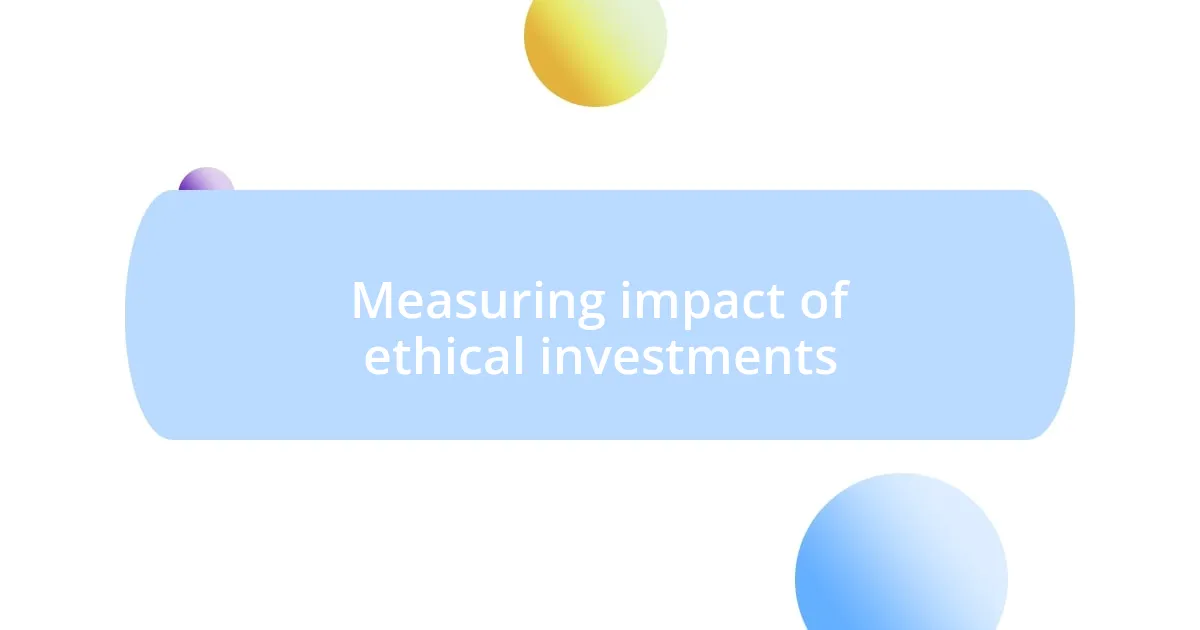
Measuring impact of ethical investments
Measuring the impact of ethical investments can be quite enlightening, but it often requires a multifaceted approach. I remember sitting down with a spreadsheet to crunch the data on my investments, feeling a mix of excitement and apprehension. How do you put a number on social good? I realized that tracking metrics such as carbon footprints, community engagements, and employee satisfaction can give a clearer picture of the tangible impacts.
I’ve also found that qualitative assessments play a vital role alongside quantitative data. For instance, I once attended a community event hosted by one of my ethical investments, and hearing the stories of real people impacted by their initiatives made the statistics come alive. This moment made me wonder: do you ever seek out these personal connections in your investments? They remind us that behind every number is a story or a life changed for the better.
Another effective way to measure impact is through third-party evaluations. I recall discovering that one of my investments had been rated by an independent organization focused on social responsibility. Their comprehensive report provided insights that even I missed during my research. Do you think having that extra layer of credibility enhances trust in our investment choices? For me, it reassured me that my money was contributing to something meaningful, making my ethical investment journey all the more fulfilling.
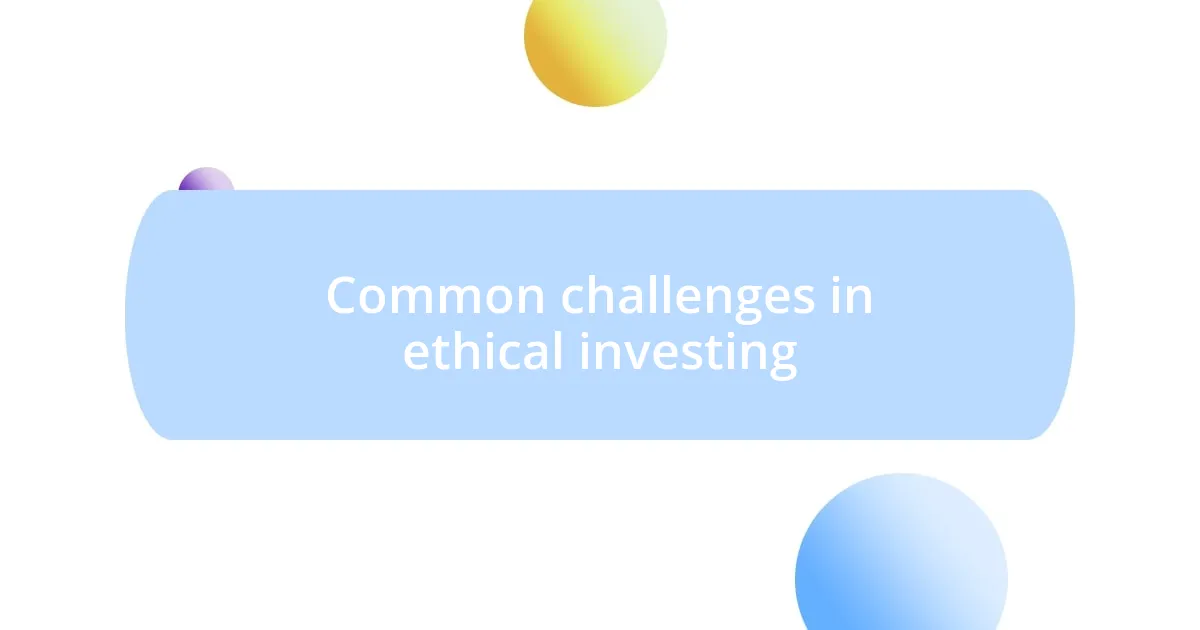
Common challenges in ethical investing
Investing ethically comes with its own set of hurdles that can be tricky to navigate. One of the most common challenges I’ve faced is the sheer variety of definitions surrounding what constitutes “ethical.” When I first started, I was overwhelmed; some funds labeled themselves as socially responsible while others focused on environmental sustainability. How do you even begin to compare them? This ambiguity can lead to a lot of confusion and can make it hard to align my investment choices with my principles.
Another obstacle that stands out to me is the trade-off between ethics and returns. I once invested in a green technology fund, hopeful about its potential impact. However, the returns were lower than I anticipated, stirring up a conflict in my mind. Should I prioritize financial growth or align with my ethical standards? It’s a balancing act that requires constant reflection and adjustments, which can feel frustrating at times. I’ve learned that finding the right balance is a journey, not a destination.
Finally, keeping up with the changing landscape of ethical investing is another challenge that can feel daunting. Just last year, a company I supported for its sustainable practices faced backlash for ethical violations. I found myself questioning how much I truly know about the companies I invest in. It really pushed me to dig deeper and stay informed, but I wonder—do you think it’s even possible to fully understand the complexities of every organization? I’ve realized that while I may not have all the answers, staying engaged and curious is key to making informed ethical choices.




